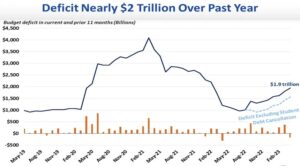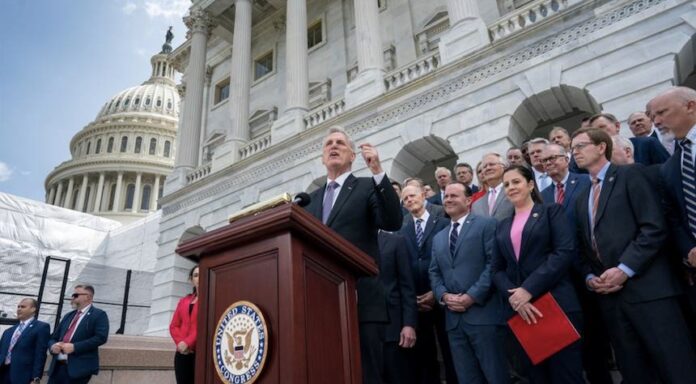The government’s spending on the pandemic led to a deficit of $3.1 trillion in 2020, and $2.8 trillion in 2021. The debt was the largest in history and its repayment caused inflation to spike.
The inflation is somewhat moderating. In 2022, the federal deficit will drop by the most amount ever recorded; from $2.8 trillion down to just under $1 trillion.
In 2023, however, the projected deficit will nearly double to $2 trillion. The economy has grown steadily, but not spectacularly.
The Washington Post says that this is counterintuitive.
Many economists were surprised by the sudden increase in the red. When the economy is growing, deficits tend to shrink because the government spends less to protect people who lost their jobs and businesses owe higher taxes. During downturns, deficits tend to increase as these factors reverse. The current increase in the deficit coincides with a period when the economy is experiencing strong growth.

Marc Goldwein is the senior vice president of the Committee for a Responsible Federal Budget. He said that “the deficit will double in size from 2022-2023.” “This should lead to a serious review of federal policy in the future, but I’m worried it won’t.”
Budget deficits have soared due to lower tax receipts, higher interest rates, and increased interest payments.
“To see this in an economy with low unemployment is truly stunning. There’s never been anything like it,” Jason Furman, who served as a top economist in the Obama administration and is now an economics professor at Harvard, told the Washington Post. “A good and strong economy, with no new emergency spending — and yet a deficit like this. The fact that it is so big in one year makes you think it must be some weird, freakish thing going on.”
Joe Biden, Republicans in Congress, and other politicians are racing to the edge of fiscal cliffs to see who will jump off first.

The federal government spent approximately $6.7 trillion between August 2022 and this July while earning roughly $4.5 trillion. According to the Committee for a Responsible Federal Budget, this represents a 16 percent increase in total spending compared to last year. Revenues decreased by 7 percent.
The year before, the deficit had fallen dramatically in part due to the expiration of trillions of emergency COVID aid that was approved by the Trump and Biden Administrations. Even though COVID-19 spending fell this year, there were other factors that pushed up overall spending.
Many on the left say, “No worries”.
Matthew C. Klein is the publisher of Overshoot a subscription-based research service that focuses on the global economy. He said, “If you look at places that have had real fiscal problems that have reached the point of crises, we know how they look. This doesn’t even look remotely like those places.” You can debate whether this is a crisis or not.
He’s right. The economy won’t explode — or contract — in the next 24 hours. A clock is ticking somewhere. Once it reaches zero, Mr. Klein and other numbskulls will tell us that their predictions were accurate.




